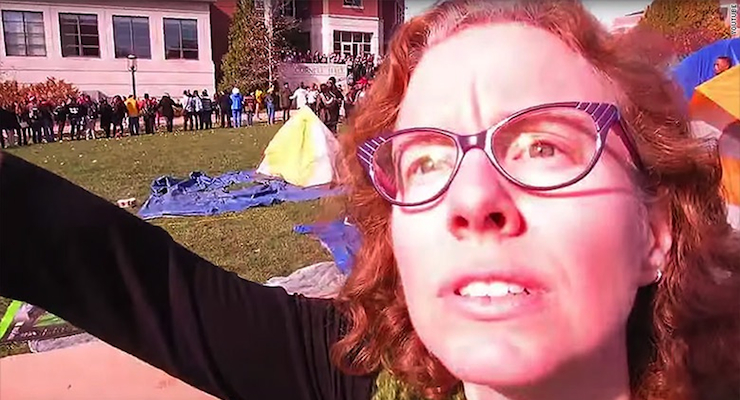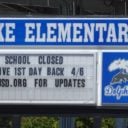

Melissa Click, a professor at Mizzou’s Department of Communications, was among those who were harassing and blocking reporters during the protests on the University of Missouri campus Monday. She has since resigned. (Photo: Video Screenshot)
The latest example of America’s places of higher learning serving as little more than an indoctrination tool for the Far Left’s visions of nirvana comes by way of Iowa State University and its planned “Social Justice Summit” set for mid-February.
Enough of the social justice already. It’s not that the idea of “justice for all” is a flawed concept. It is, after all, part of our national flag pledge – “with liberty and justice for all.” But where these training sessions go awry is turning “justice for all” into “justice for the few” or “justice for the select.”
Or worse, as Iowa’s day-and-a-half long summit does, turning the definition of justice into something it’s not.
The university defines social justice on its website as “the continuous process of eliminating ignorance and prejudice … to bring about greater equity among all members of society” via – and this is the key part – the “redistribution of resources, opportunities, and responsibilities.”
Whenever redistribution is talked about, the next question that creeps is this: By whose authority?
And far, far too often those discussing this notion aren’t doing so in a church or nonprofit setting, where charity or Christian-based values dictate the voluntary terms of the redistribution. Rather, they’re talking about it as a government venture – indeed, as a government mandate. That’s hardly constitutional. The redistribution of “resources, opportunities, and responsibilities” by government is a socialist principle.
This is what our next generation of leaders is learning.
The topics of social justice discussion range from minority rights, equality issues between genders and among races, and LGBT causes, to ones dealing with poverty, housing, education and jobs, mostly as seen through the lens of race, gender and sexual preferences.
The problem with this type of analysis, however, is it discounts the notion of God-given talents – the idea that all individuals are embedded with seeds of greatness from a higher power, albeit not all are given the same abilities – while it plays up the victim card. It teaches the idea, say, that a homeless man is homeless because he was raised by alcoholic parents, or because he was the product of poverty, or because he suffered unfairly and turned to drugs as solace – but not because he made poor choices in life that led to his deplorable condition.
So when he’s a victim, and not accountable for his own choices, his problems become all of society’s – and if that line of logic is drawn to its conclusion outside of a church or charitable setting, the inevitable result is more government action, more bureaucratic overreach, more taxpayer burdens.
It’s one thing to look for root causes for human misery. It’s quite another to make the leap that all human misery can be cured by government provisions.
But that’s social justice training. And it’s not just in Iowa – or for just a day or two. The seven-day Social Justice Week kicks off at Georgetown University on February 20. It just wrapped at the University of Miami. It’s due to begin in March at Appalachian State University in Boone, North Carolina.
Those are just the voluntary offerings – the little side events presented on campus as “something students can do” to pass the time. As Inside Higher Ed reported, plenty of other schools have been pushing social justice as a core curriculum, and for plenty of years.
In 2012, the outlet reported: “Whitman College in Washington and Philander Smith College in Arkansas both have new programs on social justice. Brandeis University offers a minor in social justice and social policy. Grinnell College offers an award to young social justice leaders. Lake Forest College in Illinois also offers a minor. Saint Mary’s College of California just announced a new master’s degree concentration in social justice leadership. And the movement isn’t limited to private institutions: Arizona State University introduced a master’s degree in social justice and human rights last fall.”
Get ready for the lawsuits. It won’t be long before these highly trained, highly educated and highly charged graduates learn the best way to bring about their visions of equality and justice isn’t the poster, protest and banner, but rather the courts, state houses and Congress.
[mybooktable book=”police-state-usa-how-orwells-nightmare-is-becoming-our-reality” display=”summary” buybutton_shadowbox=”true”]



